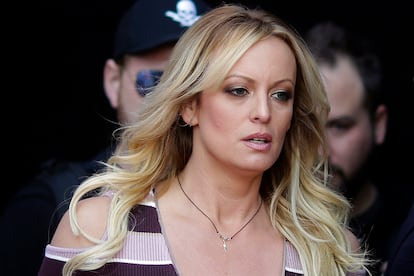How the ‘Stormy Daniels case’ put Trump up against the ropes
Since the affair became public knowledge, the adult film actress has been through seven years of continuous public scrutiny and pressure from the former president’s powerful legal machinery


There is some poetic justice for Stormy Daniels in the indictment of Donald Trump, after her reputation was dragged through the mud. The adult film star will have the intimate satisfaction of having dared to stand up to the all-powerful Trump, who tried to buy her silence about their affair for $130,000. Nearly seven years after the money that could now send a former president to jail changed hands, Stormy Daniels, the stage name of Stephanie Clifford, is now scoring some points: the case to which she lent her name is already the most serious prosecution of a president in U.S. history.
Since the affair became public knowledge, it has been seven years of continuous public scrutiny under unequal conditions: the powerful legal machinery of the business tycoon against the word of an adult film actress branded as an opportunist for denouncing a relationship that had taken place a decade earlier. Daniels was also the victim of her own lawyer, media personality Michael Avenatti, whom a Manhattan court convicted last year of stealing $300,000 from the advance the actress was to receive for publishing her memoir. Avenatti had previously been sentenced to two years in prison for extortion. In 2018, he was arrested for gender-based violence.
In 2018, when Trump was in the White House, Daniels revealed that they had had an affair in 2006 at one of the tycoon’s golf clubs. The actress went to court to declare null and void the confidentiality contract on which the agreement was based, claiming that Trump never signed it. Besides the legal battle, Avenatti, who in just six months gained international fame, embarked on an aggressive media campaign that placed the litigation at the center of the country’s political debate. There was no shortage of people who believed that the case might bring Trump down, because it was the first one that directly affected him, with Daniels and Avenatti as the fierce advance guard of what was once called “the resistance” to the Republican. But the attempt by both to take a judicial swipe at the president proved unsuccessful: Daniels’ defamation suit against the president, who had previously insulted her, was dismissed, and the judge ordered her to pay $293,000 in legal fees.
The case came to light as one more ramification of the investigation that special counsel Robert S. Mueller undertook into possible connections between Trump’s circle and the Kremlin to interfere in the 2016 election, with the alleged aim of favoring the Republican’s victory over Democrat Hillary Clinton, and which gave rise to the first impeachment to which he was subjected. The affair became a considerable threat to his presidency, and these days could hurt his bid for re-election in 2024.
Daniels received the money through an entity set up by Michael Cohen, who for a decade served as Trump’s personal lawyer and fixer in charge of the dirty work, including intimidating overly critical journalists. In 2018 he was sentenced to three years in prison after pleading guilty to charges that included campaign finance violations stemming from the payment to Daniels. Cohen, whom Trump has labeled a whistleblower and worse, went down to the Manhattan district attorney’s office twice last week, where he testified behind closed doors before the grand jury.
The actress, who also testified last week, claimed at the time that she signed the confidentiality clause after being threatened so she would keep quiet about the affair with Trump. Cohen was the one to disclose it to the media. Trump’s representatives, and the tycoon himself, have denied at all times that there was ever a relationship.
Trump’s company “falsely accounted” for the monthly payments to Cohen as legal expenses, according to federal prosecutors who filed criminal charges against the lawyer. In total, Cohen received $360,000 plus a $60,000 bonus for his services. But Cohen’s confession has bolstered Daniels’ allegation, and now a New York grand jury, composed of 23 people with a quorum of 16 and a required unanimity of at least 12, has determined that the two were telling the truth, and that someone was lying.
Sign up for our weekly newsletter to get more English-language news coverage from EL PAÍS USA Edition
Tu suscripción se está usando en otro dispositivo
¿Quieres añadir otro usuario a tu suscripción?
Si continúas leyendo en este dispositivo, no se podrá leer en el otro.
FlechaTu suscripción se está usando en otro dispositivo y solo puedes acceder a EL PAÍS desde un dispositivo a la vez.
Si quieres compartir tu cuenta, cambia tu suscripción a la modalidad Premium, así podrás añadir otro usuario. Cada uno accederá con su propia cuenta de email, lo que os permitirá personalizar vuestra experiencia en EL PAÍS.
¿Tienes una suscripción de empresa? Accede aquí para contratar más cuentas.
En el caso de no saber quién está usando tu cuenta, te recomendamos cambiar tu contraseña aquí.
Si decides continuar compartiendo tu cuenta, este mensaje se mostrará en tu dispositivo y en el de la otra persona que está usando tu cuenta de forma indefinida, afectando a tu experiencia de lectura. Puedes consultar aquí los términos y condiciones de la suscripción digital.








































